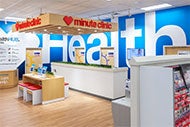

Payers Push to Slow Disease Progression
 Payers like Humana and Oscar Health, along with Aetna, represented by its parent company CVS Health, provided updates on how their evolving strategies are reducing health care costs and driving health behaviors. Humana CEO Bruce Broussard said the flurry of payer mergers and acquisitions in the payer field largely have been fueled by a desire to slow disease progression. Humana’s investments in primary care and physician groups illustrate its commitment in this area.
Payers like Humana and Oscar Health, along with Aetna, represented by its parent company CVS Health, provided updates on how their evolving strategies are reducing health care costs and driving health behaviors. Humana CEO Bruce Broussard said the flurry of payer mergers and acquisitions in the payer field largely have been fueled by a desire to slow disease progression. Humana’s investments in primary care and physician groups illustrate its commitment in this area.
CVS Health’s acquisition of Aetna fits this profile. CEO Larry Merlo told conference attendees that CVS stores are focused on offering 80% of what a primary care physician can treat, adding that the company is looking to partner with doctors, not replace them. The retailer’s HealthHUB format offers zero or low co-pays for certain Aetna health plan members using CVS services underpins the company’s strategy. The company is on track to have 1,500 HealthHUB stores operating by the end of 2021, Merlo said.
And in an important shift, companies like Oscar and Devoted Health, which offer Medicare Advantage plans, are changing the customer experience. They’re making the experience more about health than their insurance products.
Oscar CEO Mario Schlosser told attendees that his company’s ability to achieve higher levels of engagement with its small group and Medicare Advantage products have led to greater retention, higher premiums, reduction of network costs through direction of doctor visits to lower cost, high-quality providers and channeling of prescription drugs to lower-cost choices via the establishment of a $3 co-pay for “preferred” drugs. These efforts have reduced total health care costs, Schlosser said, adding that Oscar also has been able to boost the use of telemedicine patient visits to 40% among patients with chronic conditions and to 30% among its general patient population.



